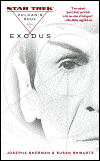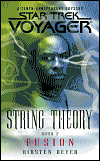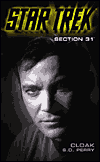
Vulcan's Soul 1: Exodus, by Josepha Sherman, Susan Shwartz
Book Review by David Roy
Have you read this book?
It's been a long while in between Star Trek books for Josepha Sherman and Susan Schwartz. The last book, "Vulcan's Heart," was a complete and utter disaster as far as this Trek fan was concerned. The overuse of continuity, the bad characterization and annoying writing just soured me on it. However, since I had enjoyed "Vulcan's Forge" so much, I thought I would give them a chance to redeem themselves. Their latest book, Vulcan's Soul: Exodus, does bring them back up in my opinion. The only problem is (and this could be a Pocket Books marketing decision, for all I know), it's a trilogy of hardcover books that really only needs two books, maybe even one, unless subsequent books are much longer than the first. At a meager 264 pages, the first volume is very slight. At hardcover prices, that's almost a crime, in my opinion.
Exodus is a divided book. Parts of it take place in ancient Vulcan history, in the time of Surak. The other part takes place a year after the Dominion War from the "Deep Space Nine" television series. A new race has attacked the Romulan Empire. All of the Alpha Quadrant races (the Romulans, Klingons, Federation, and others) are tired and depleted after the previous war and thus ripe for the picking. The new race, the Watraii, claims that the Romulans forced them off of their homeworlds millennia ago and they are bound and determined to retake their space. Since records of the Vulcan exodus to the worlds that became Romulus & Remus have been lost, there's no way to verify their claim, but people are still horrified at the destruction of innocent Romulan colonies. While nobody will officially do anything, Captain Saavik, her husband Ambassador Spock, Admirals Pavel Chekov and Uhura form an alliance of ships to go aid the Romulans at the risk of their own courts-martial.
Meanwhile, we see ancient history (through the conceit of a cut-scene from 10 years after "Vulcan's Heart" where Spock puts on a crown from the days of the Exodus that also serves as a memory recorder) and see the story of the Exodus from Vulcan. In Exodus, we see everything leading up to this wave of refugees. The Vulcans have not adopted logic as their guide and are extremely warlike, bringing their planet to the brink of extinction. One man, Surak, is convinced that the only way to save Vulcan (or at least preserve Vulcan heritage) is to take the best and the brightest and have them leave Vulcan as soon as possible. Needless to say, there are complications from this.
Vulcan's Soul: Exodus was surprising because, while I thought Sherman & Schwartz would be writing a sequel to "Vulcan's Heart," I didn't realize it was going to be a trilogy in itself. It's an interesting concept, as we learn even more about ancient Vulcan history. I'm not sure how well it goes with Diane Duane's "Spock's World," which also dealt with ancient Vulcan history, as I haven't read it in a long time. I'd be interested in knowing. Much like "Spock's World," Sherman and Schwartz give us a book that jumps back and forth from now to history and back again. Thankfully, they make both of these stories fairly interesting. What I found even more intriguing was the conference between all of the Alpha Quadrant races that took place 14 years before the "current" events of the novel. This is the super-secret conference Spock was attending when he hears that the inscriptions on the crown have been translated, bringing him back to Vulcan and enticing him to put it on. The memories in this crown are what we are shown. Is the conference itself important? I hope so, because we never see it or hear of it again in the first book. I'll be disappointed if it's not.
In addition to this intrigue, I am anxiously looking forward to seeing how the history pans out. If I'm not mistaken, Trek lore states that the violent Vulcans left to find their own planet when they would not follow Surak's teachings. In this book, it looks like the logical Vulcans are the ones trying to leave. I'm sure this discrepancy will be explained, and I can't wait to see how everything pans out. That's one of the strengths of the book. There are so many cool ideas and interesting premises that the book leaves the reader clamoring for more.
Characterization is not forgotten, as Sherman & Schwartz do a wonderful job of it. Most of my complaints from "Vulcan's Heart" are completely gone, with only a couple stubbornly resisting exorcism. Spock & Saavik still act like teenage lovers at times (not in their actions, but in their thoughts that the authors share with us) which seems a bit out of character, but everybody else is nailed. Chekov is a grown-up version of the young ensign he was in the Original Series. He's much more responsible, but you can see the kid in him trying to burst out at times. The scene in the holodeck where he's training the cadets, throwing one disaster after another at them, is priceless. Uhura is as graceful as ever and, despite the fact that I never would have thought this before, she makes a wonderful chief of Starfleet Intelligence. Even the characters in Vulcan history are really well done. Karatek is the main character, and he's a Vulcan propulsion expert who is working on warships but thinks that resources and research should go to space exploration. When he meets Surak and his followers, he goes on a journey with them, attempting to convince other Vulcans of the rightness of Surak's teachings. He begins the book being extremely skeptical, but by the end, he is a seasoned leader, ready to lead his people across the depths of space.
There are a few problems with the book, but they are extremely minor. The first should have been caught by an editor. Three times in the space of a page, Surak is called "Sarek" by the narration. This wouldn't be an issue if Sarek wasn't Spock's father and a major Trek character. This was really minor, as it only happened in one sequence, but it was there. The other problem (and this was new to my readings of Sherman & Schwartz) was a bit of repetition of character traits that I so despite in Harry Turtledove's writing. They don't do it to nearly that extent, but it is there. It's most prominent in the two children that Karatek ends up adopting. In one scene, Kovar takes his "S name," or the name he will take under Surak's tutelage. Then, in the next memory sequence (after a sequence in the current time period), we are told that Solor used to be Kovar. Yes, we know that. You just told us that. The same happens with his sister, and it got a bit annoying.
Still, it's not enough for me to take any real points off. This was a fantastic follow-up to "Vulcan's Heart." While it doesn't redeem that one, it certainly has brought their stock back up to where it was when "Vulcan's Forge" came out. And that takes some doing.
Exodus is a divided book. Parts of it take place in ancient Vulcan history, in the time of Surak. The other part takes place a year after the Dominion War from the "Deep Space Nine" television series. A new race has attacked the Romulan Empire. All of the Alpha Quadrant races (the Romulans, Klingons, Federation, and others) are tired and depleted after the previous war and thus ripe for the picking. The new race, the Watraii, claims that the Romulans forced them off of their homeworlds millennia ago and they are bound and determined to retake their space. Since records of the Vulcan exodus to the worlds that became Romulus & Remus have been lost, there's no way to verify their claim, but people are still horrified at the destruction of innocent Romulan colonies. While nobody will officially do anything, Captain Saavik, her husband Ambassador Spock, Admirals Pavel Chekov and Uhura form an alliance of ships to go aid the Romulans at the risk of their own courts-martial.
Meanwhile, we see ancient history (through the conceit of a cut-scene from 10 years after "Vulcan's Heart" where Spock puts on a crown from the days of the Exodus that also serves as a memory recorder) and see the story of the Exodus from Vulcan. In Exodus, we see everything leading up to this wave of refugees. The Vulcans have not adopted logic as their guide and are extremely warlike, bringing their planet to the brink of extinction. One man, Surak, is convinced that the only way to save Vulcan (or at least preserve Vulcan heritage) is to take the best and the brightest and have them leave Vulcan as soon as possible. Needless to say, there are complications from this.
Vulcan's Soul: Exodus was surprising because, while I thought Sherman & Schwartz would be writing a sequel to "Vulcan's Heart," I didn't realize it was going to be a trilogy in itself. It's an interesting concept, as we learn even more about ancient Vulcan history. I'm not sure how well it goes with Diane Duane's "Spock's World," which also dealt with ancient Vulcan history, as I haven't read it in a long time. I'd be interested in knowing. Much like "Spock's World," Sherman and Schwartz give us a book that jumps back and forth from now to history and back again. Thankfully, they make both of these stories fairly interesting. What I found even more intriguing was the conference between all of the Alpha Quadrant races that took place 14 years before the "current" events of the novel. This is the super-secret conference Spock was attending when he hears that the inscriptions on the crown have been translated, bringing him back to Vulcan and enticing him to put it on. The memories in this crown are what we are shown. Is the conference itself important? I hope so, because we never see it or hear of it again in the first book. I'll be disappointed if it's not.
In addition to this intrigue, I am anxiously looking forward to seeing how the history pans out. If I'm not mistaken, Trek lore states that the violent Vulcans left to find their own planet when they would not follow Surak's teachings. In this book, it looks like the logical Vulcans are the ones trying to leave. I'm sure this discrepancy will be explained, and I can't wait to see how everything pans out. That's one of the strengths of the book. There are so many cool ideas and interesting premises that the book leaves the reader clamoring for more.
Characterization is not forgotten, as Sherman & Schwartz do a wonderful job of it. Most of my complaints from "Vulcan's Heart" are completely gone, with only a couple stubbornly resisting exorcism. Spock & Saavik still act like teenage lovers at times (not in their actions, but in their thoughts that the authors share with us) which seems a bit out of character, but everybody else is nailed. Chekov is a grown-up version of the young ensign he was in the Original Series. He's much more responsible, but you can see the kid in him trying to burst out at times. The scene in the holodeck where he's training the cadets, throwing one disaster after another at them, is priceless. Uhura is as graceful as ever and, despite the fact that I never would have thought this before, she makes a wonderful chief of Starfleet Intelligence. Even the characters in Vulcan history are really well done. Karatek is the main character, and he's a Vulcan propulsion expert who is working on warships but thinks that resources and research should go to space exploration. When he meets Surak and his followers, he goes on a journey with them, attempting to convince other Vulcans of the rightness of Surak's teachings. He begins the book being extremely skeptical, but by the end, he is a seasoned leader, ready to lead his people across the depths of space.
There are a few problems with the book, but they are extremely minor. The first should have been caught by an editor. Three times in the space of a page, Surak is called "Sarek" by the narration. This wouldn't be an issue if Sarek wasn't Spock's father and a major Trek character. This was really minor, as it only happened in one sequence, but it was there. The other problem (and this was new to my readings of Sherman & Schwartz) was a bit of repetition of character traits that I so despite in Harry Turtledove's writing. They don't do it to nearly that extent, but it is there. It's most prominent in the two children that Karatek ends up adopting. In one scene, Kovar takes his "S name," or the name he will take under Surak's tutelage. Then, in the next memory sequence (after a sequence in the current time period), we are told that Solor used to be Kovar. Yes, we know that. You just told us that. The same happens with his sister, and it got a bit annoying.
Still, it's not enough for me to take any real points off. This was a fantastic follow-up to "Vulcan's Heart." While it doesn't redeem that one, it certainly has brought their stock back up to where it was when "Vulcan's Forge" came out. And that takes some doing.
|
Click here to buy Vulcan's Soul 1: Exodus, by Josepha Sherman, Susan Shwartz on Amazon
|
Vulcan's Soul 1: Exodus, by Josepha Sherman, Susan Shwartz on Amazon

| More Books You Might Like |
Comment on Vulcan's Soul 1: Exodus, by Josepha Sherman, Susan Shwartz
| Comments on Vulcan's Soul 1: Exodus, by Josepha Sherman, Susan Shwartz |
| There are no comments on this book. |


